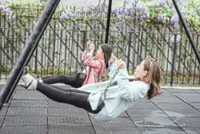It has long been believed that ageing makes the body more vulnerable to physical exertion and slows down recovery.
A major study published in the Journal of Aging and Physical Activity challenges this idea.
Indeed, it shows that older people recover just as well as younger people after physical activity.
Based on 36 rigorously-selected studies, this meta-analysis compares 389 young adults with 390 older people.
All were observed for at least 24 hours after exercise, without recourse to external recovery aids.
The results indicate that no significant difference was observed between the two groups.
Even more astonishingly, the older participants systematically reported feeling fewer aches and pains than their younger counterparts.
These findings, reported by the Study Finds website, contradict the idea that ageing leads to a decline in muscle regeneration capacity, due in particular to a reduction in protein synthesis and the number of satellite cells.
Several hypotheses have been put forward to explain why muscles seem to resist the effects of time so well.
The study authors believe, for example, that greater muscle stiffness linked to collagen accumulation could make the muscles of older people less vulnerable to micro-injury.
What’s more, as the physical efforts made by seniors are often more moderate, they typically cause less damage.
Furthermore, creatine kinase levels – a marker of muscle damage – are generally lower in older adults.
A difference according to sex between age groups was observed only in men, underlining the importance of developing specific research on women.
Beyond the biological aspects, this study could also help break down a psychological barrier.
For fear of injury or slow recovery, many older people are reluctant to engage in physical activity.
Yet, current data sends a clear message: age should not be a barrier to exercise.
In a world where the United Nations estimates the 60+ population is set to double by 2050, the findings of this study represent a major strategic lever for public health.
Physical activity, the cornerstone of successful ageing, makes a decisive contribution to maintaining independence, mental health and strengthening social ties.
So, in the fight against sedentary lifestyles, it could be worth reminding older people that their muscles are tougher than they might think. – AFP Relaxnews





